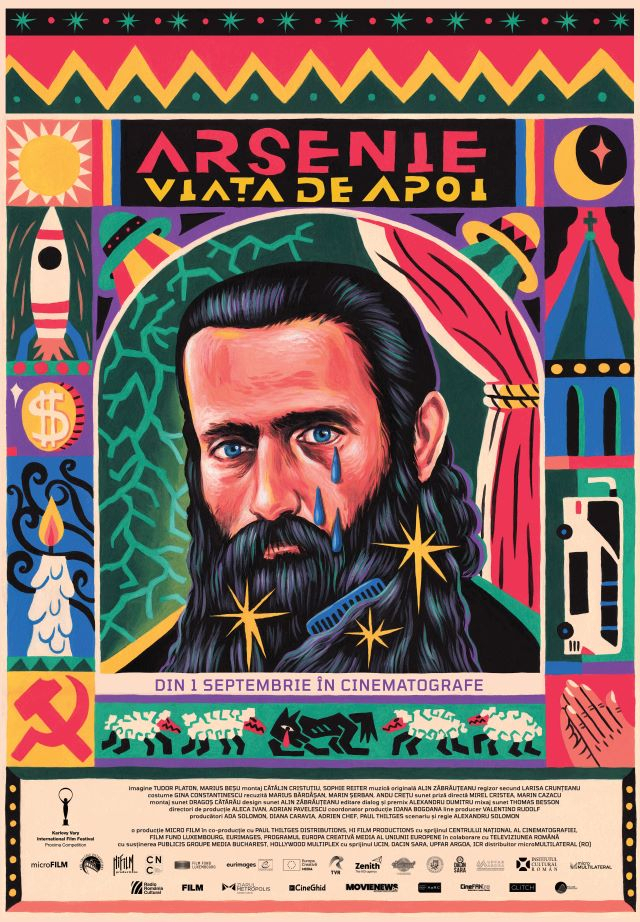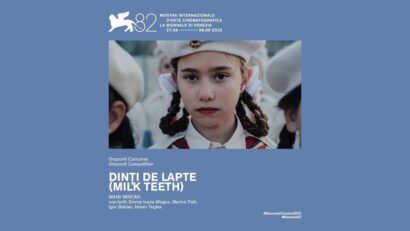“Arsenie. An Amazing Afterlife,” a documentary road movie by Alexandru Solomon
The film has recently reached Romanian cinema halls and has already generated heated debates

Corina Sabău, 14.10.2023, 13:29
The feature film “Arsenie. An Amazing Afterlife,” a documentary road movie written and directed by Alexandru Solomon and inspired by the life of the monk Arsenie Boca and the cult created around him, has recently reached Romanian cinema halls.
The film premiered at the 57th Karlovy Vary Festivals “Proxima” competition and will also be part of the national selection of the Astra Film Festival between October 15 and 22.
Screened in several cities in Romania, the film has already generated heated debates and controversies. Two public institutions cancelled the screening of Alexandru Solomons work, and the Sibiu Archbishopric called on the organisers of Astra Film Festival to ban the screening of the documentary. Astra Film Festivals organisers replied, “A documentary has the unique capacity to bring to the forefront peoples actual problems and debates, to invite the public to look at a topic from several different perspectives. A documentary carries the imprint of the values shared by its producers, and it often touches on highly sensitive topics, to which the public may respond very differently. And this is a gain. We all want an open society, with people who are free in all respects.”
Alexandru Solomons documentary follows Arsenie Boca, the monk persecuted by the communist regime, in a staged pilgrimage. The pilgrims and the director retrace the miracles allegedly performed by Arsenie Boca, discuss them and take turns making confessions. Through the eyes of the believers scrutinised by a sceptical director, the film actually depicts how the Romanian society reflects in the image of this human about to be canonised.
Alexandru Solomon. “I think the Arsenie Boca phenomenon is quite relevant for how the Romanian society works at present. This is a phenomenon, a construct that has taken shape under our eyes over the past 30 years. And what is interesting is that few monks or saints have had such a reach, such popularity in the 21st Century. Im talking here about this cult that has grown steadily since Arsenie Bocas death in 1989. This has been the direction of my effort, as I have already said the film is not and is not intended to be a biography of Arsenie Boca, even though it retraces some scenes from his life. This is in fact why I resorted to this formula which is somehow borderline fiction, because this cult is a series of layers of fiction, of legend built upon true facts. And ultimately one can no longer distinguish between what is invented and what is historical fact. I was interested in this way of fictionalising a real person and in how, at the end of the day, legend becomes more powerful than history.”
Alexandru Solomon believes the legend of father Arsenie Boca fills a void created in many Romanians by the disenchantment of the past decades. As the director puts it, it is a film about how “the Romanian society reflects in this cult, in this construct of a very popular character, which offers hope and comfort during these times.”
Alexandru Solomon: “What I tried to understand, beyond the influence of the Orthodox Church on all our lives, was the popular foundation of this type of cult, of this kind of thinking, a kind of magical thinking after all, which breaks with Europes rationalist tradition. And its not a local, Romanian occurrence alone. If you look around the world, there is a resurgence of magical thinking, from the conspiracy theories in America, to Turkey, Poland and elsewhere. As for Romania, I believe very broad categories of people have an acute sense of social abandonment, and they find hope and comfort in this area, in religion. And the confusion I speak about at the end of the film has to do with my conclusion that, no matter how one compares legends with historical fact, magical thinking with reason, there is a barrier between them, a wall that cannot be overcome. People will listen to rational explanations, they will read about the facts, but this will not change their beliefs in the least. This is something I understood by making this film and I respect peoples faith, this is something you cannot touch. I believe it is their right and as long as it helps them, everything is good, but a problem that the film tackles is what happens when this faith is manipulated. When this faith is used for commercial, financial and even political purposes, and when it becomes a rule imposed on others as well, some tenet one has to observe.”
Alexandru Solomon, a director and director of photography, is known for documentaries such as “The Great Communist Bank Robbery” (2004), “Cold Waves” (2007), “Kapitalism – Our Improved Formula” (2010), “Romania: Four Countries” (2015), and “Tarzans Testicles” (2017). Since 2010, Alexandru Solomon has been teaching at the National Arts University UNArte, and he is also the president of One World Romania Association. In 2016, he published a monograph entitled “Representations of Memory in Documentary Cinema.” (AMP)






























